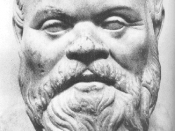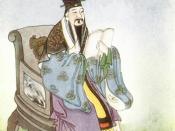Chuang Tzu, and Mencius were two of the most important figures in Chinese philosophy and literature. Chuang Tzu was of the Taoist tradition; his works are eloquent and full of wonderful imagery. Mencius was a Confucian philosopher; as such his writings are more practical, and less colourful then Chuang Tzu's.
The purpose of this paper is to compare and contrast, in terms of imagery and language, the works of Chuang Tzu and Mencius. To do this, two parables from Chuang Tzu and two passages from Mencius will be discussed and compared. However, first a brief introduction to both men will given, as so to understand the authors. Following this the texts can be dealt with in terms of imagery and language.
Chuang Tzu's familiarity with and confident handling of the technical language of ancient Chinese semantics make it probable that he had the ancient Chinese equivalent of analytic philosophical training.
It is, thus, no accident that even philosophers sceptical of the general philosophical quality of Chinese thought hold him in the highest regard
Chuang Tzu, lived somewhere in the time between 369-286 B.C., and is one of the defining figures in Taoism. Chuang Tzu wrote many parables, which have been collected into a book of his name. He probably authored only parts of the first seven chapters of the present text, the so-called Inner Chapters. The others were written either by followers of thinkers or related but different theoretical orientations. They often expand on themes of the "inner" chapters. Chuang Tzu's linguistic skill holds him a part from other classical Chinese philosophers, Taoist or Confucian. While westerners may often find Chuang Tzu's contemporaries hard to read due to the choppy style of their writing, the same cannot be said of Chuang Tzu. His work is beautifully written regardless of...



Good attempt
You did a good job, but I don't really know what to say about you stating, "The purpose of this paper..." Sometimes teachers tell us to do things and we do them thinking they're right and they are not. You seem like you worked pretty hard on it, so I won't give you a bad rating. However, remember to cite your sources next time.
1 out of 1 people found this comment useful.